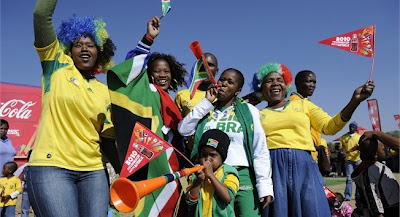
I pretty like the Quality of Life survey of World's best cities by Monocle - not only using current statistics, Monocle has even looked into the prospect and government planning for the ranking.
This year the first place comes Munich.
(Adopted from Monocle issue 35, Volume 04, July/August 2010)
---------------
"We don't laugh, we are not colourful, we are very strict, we are orderly and proper, we are all engineers…" He laughs. "Of course, that's all true! But there is also another side: that we are a multi-shaped society, a colourful melting pot of contradictions."
Kerkloh is something of a colourful melting pot of contradictions himself. Munich Airport's CEO might have just picked up yet another Skytrax award for running Europe's Best Airport (its fifth), but when MONOCLE meets him and media relations vice president Ingo Anspach in his office fronted by views of the Alps, he's keener to show off Albin – an enormous Russian stag's head that sits on its own chair. "I am not a hunter, but I was with a Russian group. At 10am they gave me a gun and said 'At 6pm we want to eat'." Three hours of stalking through Siberian forest later they all opened fire – with only Kerkloh hitting his target. Beginners' luck, suggests MONOCLE. "Not for Albin," notes Anspach.
Such knockabout behaviour might not be every CEO's modus operandi, but then, for an airport boss, Kerkloh runs a happy ship. Thirty thousand people are employed by 500 companies at Europe's fastest-growing airport; one that's doubled in size in a decade. In part that's down to a groundbreaking 60/40 per cent partnership deal with Lufthansa. But peerless customer service has certainly helped. Commuters are promised a maximum 30-minute transfer time ("not only you but your bag as well"), they can rest at the five-star Helmut Jahn-designed Kemp-inksi Hotel (which admittedly could use an overhaul) or browse the gleaming Munich Airport Centre, a shopping, business and recreation area that connects the two terminals. Alongside outlets for the usual luxury-goods duty-free suspects, it includes everything from the world's only airport brewery (producing – what else? – Airbräu), a late-night supermarket, a dedicated FC Bayern Munich store selling 600 fan items from toasters to garden gnomes, and even a sex shop. When the Icelandic ash cloud crippled many European hubs in April, Munich worked with the Red Cross to provide beds for every one of its 2,000 stranded passengers. Factor in the anticipated green light for a third runway (although there is opposition to it), plus the proposed 2014 introduction of a €1.85bn Transrapid monorail to cut journey time for the 40km route into the Bavarian capital from 40 to 10 minutes, and you have a city taking its inhabitants' quality of life seriously.
"When I worked in Frankfurt in the 1970s," Kerkloh says of the less-progressive city, "people often said their favourite part was the airport." But that was for a different reason. "They couldn't wait to get away."
"The airport in Munich is so important," agrees Dominik Wichmann, editor of Süddeutsche Zeitung Magazin, the award-winning colour supplement with Germany's largest national daily newspaper. "Really it is a microcosm of the city. It's part of the reason that for the past four or five years people are coming back to Munich – and staying."
Once described as "about as cool as polka music on cassette", Germany's third-largest city no longer finds itself overshadowed by Berlin's "poor-but-sexy" hipness. In recent years the city could scarcely have taken its unofficial slogan, "Munich Loves You", any more to heart. Some €4m has just been invested to promote Deutsche Bahn's Call a Bike scheme to get the city cycling. When MONOCLE visited the city was preparing to allow 70,000 of its citizens into its Allianz Arena stadium to watch a European Cup match on the big screen – for free. And strict rules on working hours, combined with 15 "holy" days, mean that Munich's workforce must take seven weeks off each year, whether they want to or not.
"One of the things that is never talked about in quality of life surveys is that the best cities always close down on Sundays," says the hotelier and restaurateur Rudi Kull, when we meet over cappuccino at the Louis Hotel, one of seven ventures he oversees around the central Marienplatz. "We work hard here. But you have a day off to take care of social life, meet the grandparents, visit museums or spend it in the English Garden. If you want to stay important in industry, you have to stay healthy, have friends and have time to start a family. My advice to New York is: take Sundays off!"
And Munich is a city ideally suited to enjoying. It is spotlessly clean, a breeze to navigate and has one of the fastest-growing economies and lowest unemployment and violent crime rates in Germany. You can't fail to notice how polite and helpful everyone is and even at night it's a pleasure to walk around. The construction of skyscrapers is restricted; instead, commissions for world class architects such as Herzog & de Meuron, who built the interconnected shopping courtyards of the Fünf Höfe, or Wolf Prix of Coop Himmelb(l)au, who designed the BMW Welt flagship centre, are encouraged.
Thomas Mann, the writer who lived here for many years, wrote of the city, "Munich glows". Indeed, the sky is often a vivid blue dotted with puffy white clouds, while the relaxed, Baroque atmosphere gives the city a southern European flair. Not for nothing is Munich sometimes referred to as "Italy's northernmost city".
Though it's some 400 miles inland, in spring the 3.6 sq km English Garden becomes a surfing hangout. Look down from the Prinzregentenstrasse and you'll see an orderly queue of surfers ready to take the plunge where the Eisbach (ice brook) gushes into the park. Meanwhile Munich's compact size means an evening out typically accommodates two or three stop-offs: perhaps a gallery opening followed by an aperitivo, then some classic Bavarian food – cuisine is celebrated here in a way it just isn't in Frankfurt, Hamburg or Berlin.
Combine Munich's sense of tradition with an economy driven by information technology, biotechnology and publishing sectors and you start to understand why the city's epithet "laptops and lederhosen" has stuck.
Munich is proud to mix past with future. A stable, conservative government, which has been in power for the past 40 years, has led to numerous global corporations being based here (seven of Germany's 10 biggest, according to DAX), rubbing shoulders with a thriving start-up community. Meanwhile, two large elite universities comprise some 90,000 students – the next generation of upwardly mobile citizens.
To young people in Munich today, Sergey Brin and Larry Page are the same as Mick Jagger and Paul McCartney were for my generation," says publishing baron Hubert Burda, when we meet in his penthouse office at Hubert Burda Media, surrounded by his staggering art collection.
In the 1990s Burda worked with the government to set up Munich's Digital Advisory Board, while other city authorities were still struggling to get to grips with wi-fi. Now his annual DLD (Digital, Life, Design) Conference brings together tech entrepreneurs with everyone from the American inventor Chuck Hoberman to the British environmentalist David de Rothschild. "Young people love to work with me, because we changed the way the company works. We made it much more open. With technology we have this new way of working together."
It's a sentiment echoed by Siemens' CEO Peter Löscher. "I am constantly in close contact with Munich's mayor to talk about the right solutions for the city's needs," he says. "Munich aims at cutting its CO2 emissions in half by 2030 and our study indicates that even a reduction of 90 per cent would be possible by mid-century, without losing any quality of life. With growth of our own green portfolio we managed to increase our revenue 11 per cent year-on-year, to €23bn in 2009."
Yet technology and green thinking remain balanced by the arts and the scene in this dynamic metropolis is thriving. "Chris Dercon, director of art museum Haus der Kunst, and Frank Baumbauer, director of theatre Munich Kammerspiele, are the two people responsible for the turning point in the last three or four years," says Marc Gegenfurtner, of Munich's Department Of Arts & Culture. "They have taken arts to an international level, while simultaneously opening them up to the whole of society here."
As if to illustrate the democratisation of the scene, Museum Brandhorst, the stunning new modern art centre, was celebrating its first birthday when we visited. "We had 350,000 visitors in one year," says Professor Klaus Schrenk, its director. "A truly staggering figure." In a move typical of Munich's attitude towards its citizens, it celebrated not with a VIP cocktail party in the evening but by opening its doors all day for free.
The next night at the Haus der Kunst MONOCLE attended the launch of a new exhibition by Thomas Mayfried, the acclaimed German graphic designer. "I came to Munich to study photography," Mayfried tells us. "There is so much energy, and the climate is so easy, I fell in love with it."
But perhaps the single biggest factor that illustrates Munich's booming quality of life is this: while the rest of Germany is faced with a shrinking population, leading to media scare stories about "dead cities", it is the only centre to report an upswing in birth rate. "People are at it like rabbits," says Dominik Wichmann. "The city expects to grow its population by 7 per cent over the next five years. And you only get children when people feel safe; when you want to be embedded in a place."
To return to Dr Michael Kerkloh's earlier point, just like Frankfurt in the 1970s many Munich inhabitants also say the airport is their favourite place. But not because they can't wait to leave. "No," says Kerkloh. "Here they can't wait to come back."
More on:
http://www.monocle.com/sections/affairs/Web-Articles/Most-liveable-city-Munich1/















































